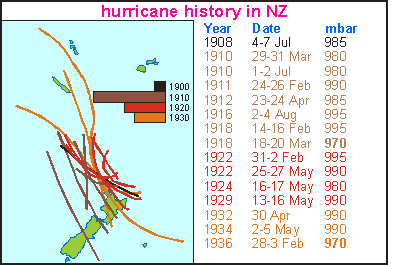Page 2 of 2
Re: Transition to La Nina?
Posted: Tue 18/09/2007 10:33
by squid
March and April are the months that Tc's are most likely to effect NZ due to the fact that is then the SST's are at their warmest in saying that in the past there have been some ripper tropical events that have effected NZ in January.
Re: Transition to La Nina?
Posted: Tue 18/09/2007 13:16
by NZstorm
some ripper tropical events that have effected NZ in January
There was one late December 1997.
Re: Transition to La Nina?
Posted: Tue 18/09/2007 15:40
by David
There was one that affected the NI 24Jan 2006 (it was more a tropical depression rather than cyclone). E gales here gusted to 100km/h and nearly 80mm of rain fell (I think much less fell further west).
Re: Transition to La Nina?
Posted: Tue 18/09/2007 21:50
by NZstorm
i think we have to go back to about 1997 (or there abouts) to the last time an ex-tropical cyclone ravaged the top of NZ.
Re: Transition to La Nina?
Posted: Tue 18/09/2007 22:15
by David
squid wrote:March and April are the months that Tc's are most likely to effect NZ due to the fact that is then the SST's are at their warmest in saying that in the past there have been some ripper tropical events that have effected NZ in January.
Gisele in 1968 was in April and Bola was in March 1988. Does anybody know if it was neutral/La nina during these years?
Also NZ's most damaging cyclone was apparently what is called the great storm of 36 (1936) which occurred in February of that year. Although there is question whether this was the worst in recorded NZ weather history, I think it might be a bit far back to know the SOI conditions at the time.

Most dates on these are in late summer - autumn.
Re: Transition to La Nina?
Posted: Tue 18/09/2007 23:13
by RWood
Giselle and Bola both occurred during neutral ENSO conditions, though the latter followed shortly after a reasonably lengthy El Nino. Feb 1936 was in the middle of quite a prolonged neutral run.
Ereck Brenstrum of MetService has done a lot of research into the 1936 storm and my recollection is that he considers it was by far the most damaging one that century, and possibly for considerably longer than that.
Re: Transition to La Nina?
Posted: Wed 19/09/2007 09:48
by Manukau heads obs
nice track graph that
what about for years after that?

Re: Transition to La Nina?
Posted: Wed 19/09/2007 15:35
by David
Manukau heads observer wrote:nice track graph that
what about for years after that?

Sorry, that's all I could find

Re: Transition to La Nina?
Posted: Tue 25/09/2007 09:20
by RWood
Re: Transition to La Nina?
Posted: Tue 25/09/2007 19:16
by NZstorm
Thanks for the update.
Aucklands weather has been cooling off this decade and a La Nina will hopefully turn that trend around.
Re: Transition to La Nina?
Posted: Wed 26/09/2007 08:23
by spwill
What impact is the developing La Nina having on our weather.
We have had a lack of cold unstable flows onto NZ, sunnier around central NZ, more rain for some parts of northern NZ and higher dewpoints up here.
Re: Transition to La Nina?
Posted: Wed 26/09/2007 08:43
by Michael
Rather have more NE even though gives higher rain but more variety and less 8/8 SW weather,good the less useless SWers the better.

Re: Transition to La Nina?
Posted: Wed 26/09/2007 20:37
by NZstorm
Yes, the odds must be very high of La Nina giving us a warmer than normal spring/summer. I have been looking at Aucklands mean temperature trends and we look to have come through a cooling cycle and should see a rise in temperatures now.

Re: Transition to La Nina?
Posted: Thu 27/09/2007 07:27
by David
September seems to have been a bit warmer this year - average low here is 8.8C and the average high 17.4C so far.
I would have thought Sep to have about 7.5C at night and 16.5C in the day or something similar. Should be o.k. for this to continue as it will hopefully mean a warmer October and December than we have been experiencing these last few years, which have been dominated by showery W and SW.
A warmer summer may be unpleasant because of Auckland's humidity, and I think a La nina bringing more north-easterlies and easterlies resulting in more rain will mean more hot sticky nights. However the days could be cooler with more rain falling, and the ground hopefully not as dry and parched.
I would have thought that higher dewpoints and humidity would generally promote a more unstable atmosphere. Does anyone in Auckland know from experience (or can suggest) what effect a La nina pattern in summer is likely to have upon frequency of thunderstorms?

Re: Transition to La Nina?
Posted: Thu 27/09/2007 08:02
by Michael
The mins probably be near average overall as we had a lot of cold nights-mornings here but then we had about 6 20° days also which were lucky to get 1 or 2 in Sept some years
Re: Transition to La Nina?
Posted: Thu 27/09/2007 20:06
by NZstorm
what effect a La nina pattern in summer is likely to have upon frequency of thunderstorms?
We could guess and say a higher frequency on the basis that a La Nina may break down the subtropical ridge that normaly dominats our summers.
September seems to have been a bit warmer this year
Yes, and August was slightly warmer too.
